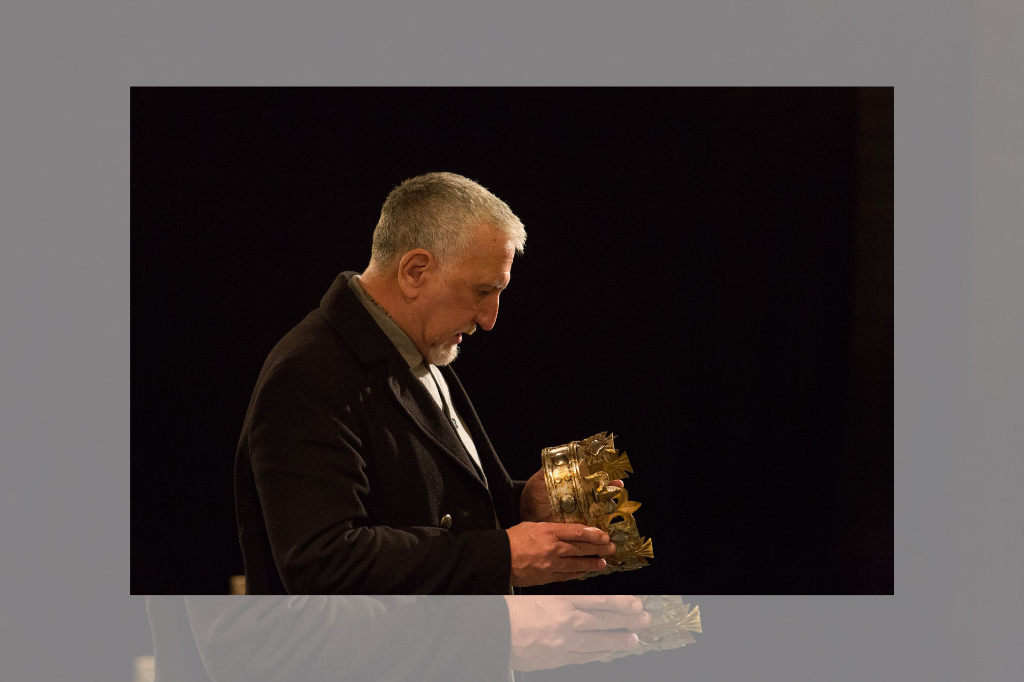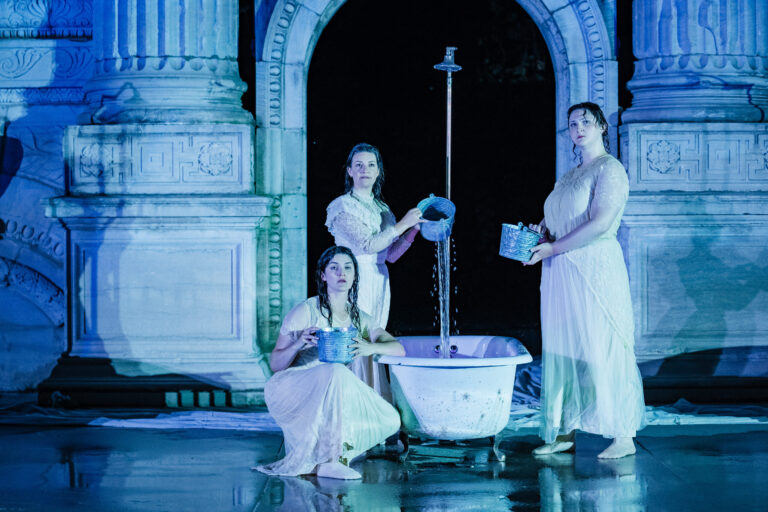REVIEW: The Tragedy of King Lear at Shakespeare BASH’d/The Theatre Centre
King Lear is a play that needs no introduction, particularly with the smattering of productions infiltrating Ontario stages throughout the 2022–23 season. With so many beleaguered kings trodding the boards in rapid succession, it might be understandable for companies to vie for attention with a creative or wild reinterpretation of the text. But rather than attempting to reinvent the wheel, Shakespeare BASH’d is sticking true to their mandate, offering welcoming, easy-to-understand Shakespeare in an intimate production that revisits the play’s roots.
It’s important to note that this production is, indeed, The Tragedy of King Lear. As with all of Shakespeare’s plays, there are multiple versions floating around in print and digital form, each telling the same story but with slight variations in line composition and distribution. The 1608 Quarto — The History of King Lear — which was printed and sold for profit by third-party vendors, is marginally shorter than the 1623 Folio, and is widely considered to be a harsher, more unflinching investigation of generational power disputes and consent versus obligation. Meanwhile, the oft-produced and more simply named King Lear is a combination of the two texts, curated to combine the two similar yet different tales into a singular story.
In their production of The Tragedy of King Lear, Shakespeare BASH’d has made the decision to present only the Folio text. Often considered a gentler, more hopeful version of the tragic tale, the story aligns well with the company’s vision of investigating classical texts from a place of curiosity, investigation, truth, and love.
It is the theme of love that is most apparent in this simple-yet-impactful race of a play. Despite explosive arguments, vicious plotting, and a grotesque display of enucleation that elicited a collective “EWWW” from the audience, director James Wallis’ production leans heavily into the emotional bonds between the different characters. Shakespeare BASH’d has a history of producing plays in unconventional theatre spaces like bars and cafes, with minimal design styling to keep the focus on the text. Although this latest venture into the bard’s work has brought the company into a theatre, they’ve remained true to their vision of presenting uncomplicated, minimalist Shakespeare. Set in the round in the intimate nest of The Theatre Centre Incubator, the audience’s proximity to the action allows us to witness moments of tenderness between fools and kings, sisters and siblings, and fathers and sons, bringing plenty of light and levity to an inarguably tragic story.
Perhaps unsurprisingly, the heavy-hitter of the production is the legendary Scott Wentworth, playing the world-weary titular king. Wentworth is in his element in the close space of the small theatre, not having to worry about projection or physical placement in order to be seen and heard. His handle on the text is effortless, and his Lear feels fully realized and non-performative, with a sense of ease born from experience and extreme comfort with classical language that places him on a level of his own.
But that’s not to say that the ensemble is unable to hold their own sharing the stage with a powerhouse of Canada’s classical theatre scene. The entire cast delivers a series of high-energy, deeply committed performances that keeps the production clipping along at an even, exciting pace. For me, the three-hour production seemed to fly by while still allowing for moments of pause and reflection, resulting in an energetic production in which the bells and whistles are the lines and characters themselves.
And the chemistry between the actors and their characters is undeniable. Madelaine Hodges and Melanie Leon bring an almost juvenile sense of sisterly competition to their respective Regan and Goneril. Meanwhile, David Mackett and Ngabo Nabea’s Gloucester and Edgar are earnest and sympathetic, with slightly slower-paced scenes that create a touching on-stage relationship. Deivan Steele’s Edmund is lascivious and perfectly horrible in that way that makes theatre villains so darn watchable. And Breanne Tice’s Cordelia is tender yet strong, resulting in some lovely moments opposite Wentworth’s Lear. Overall, it’s a strong ensemble cast with plenty of energy and the ability to power through the text without sacrificing their characters’ bonds and empathy (or lack thereof) for one another.
In true Shakespeare BASH’d style, the show’s design is minimal, with only a handful of antique-looking wooden chairs and boxes used in certain scenes. Despite the tight quarters in the Incubator space, there’s still plenty of room to play, and Wallis’ production brings the performers out of the sunken stage and into the audience. The result creates some intriguing moments and drastically raises the stakes for those watching (I saw more than one patron leaning as far as possible from the aforementioned enucleation scene, which happened less than a foot away from their feet), but occasionally felt like watching a dramatic tennis match from the front row. The actors almost never stop moving, and by intermission I found myself in need of a good neck-stretch. But the pace of movement and speedy scene transitions keeps things moving along smoothly, with few cumbersome set or costume changes to drag out the already long running time.
From a design standpoint, the company could do more to define the world of the play — only sound designer Matt Nish-Lapidus is credited in the program. At times, the lack of clear costuming choices pulls focus: suits and blouses give some characters a distinctly contemporary edge, while the joggers-and-boots combinations sported by others allude to a more classical style of dress. It’s a contrast that could be stretched to explain a characters’ class and/or station, and although it doesn’t necessarily detract from the production, a specific choice might have done more to contextualize the story without resorting to full-on classic garb or other highly stylized choices.
There are also a few jarring technical elements within the production, such as spontaneous and abrupt bursts of thunder in a show devoid of other atmospheric sound. Despite the company’s desire to keep their design elements minimal, I wish Nish-Lapidus had the opportunity to create a more robust soundscape, particularly for the storm scenes. Similarly, the lack of lighting changes to signify the show’s top and tail created a brief moment of confusion at both the start of the play and intermission. The actors simply poured on and offstage with no warning, leading to a partially obscured first line amidst the scramble to silence cell phones, as well as a slightly uncomfortable, drawn-out pause before applause. Thankfully, the lights did fade at the end of the show, leading me to wonder why that simple lighting cue hadn’t been used for the benefit of the audience at other points as well.
But the lack of design does little to curb the entire team’s effectiveness in communicating the story: this is a well-conceived, tight production from a company whose goals and theatrical preferences are clearly defined. The Tragedy of King Lear doesn’t feel incomplete or overdone, but rather deliberately thought-out and neatly packaged. I’ve seen more than 20 productions of King Lear in the past seven years, and I still found myself hearing lines in new ways, and discovering new little moments I’d previously overlooked. Shakespeare BASH’d is an aptly named, passionate independent company, and with this production, they’ve lived up to their goal: to let the text do the talking.
The Shakespeare BASH’d production of The Tragedy of King Lear runs at The Theatre Centre’s BMO Incubator until February 26, 2023. Tickets can be found here.















Comments